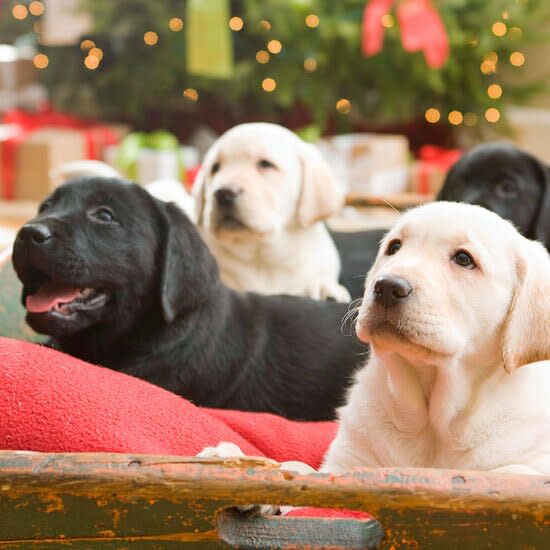Holiday Hazards for Pets
Throughout the year, holidays provide lots of opportunities to gather friends and family together. But, too often, holidays can be harmful for cats and dogs. Here's a rundown of common holiday hazards your pets should avoid to ensure a pet-friendly celebration.
Christmas

Christmas and pets don't always mix well. Cats, for example, are fascinated by the shiny decorations on the Christmas tree and have been known to swallow tinsel (which can tear up their digestive tract), break glass ornaments, and chew on electrical cords. Dogs, too, need to be diverted from the Christmas tree to prevent them from chewing on ornaments, electrical cords, and tinsel or drinking the water from the tree stand. Also, both mistletoe and holly are toxic to dogs and cats, so keep both of these decorations away from pets.
Note: Poinsettias are not poisonous, but they will give your pets a stomachache if they swallow any parts of the plant.
Thanksgiving
Thanksgiving is a time of feasting, but this doesn't mean your cat or dog should be allowed to lick greasy pans or chew on turkey bones that can easily splinter and puncture an animal's intestines. If you want to celebrate Thanksgiving with your pet, put a splash of gravy on its normal food. And never dump all the leftovers into Fido's bowl. It's also wise to keep pets out of the dining room during dinner; otherwise, Grandpa might be tempted to hand out scraps from under the table. Here are 10 things you should never feed your dog at any time of the year. Get fun recipes from Rachael Ray you can share with your pets!
The Sweet Holidays
Easter, Halloween, and Valentine's Day are three of our favorite holidays for candy. But, for dogs and cats, candy should be avoided. Chocolate, macadamia nuts, and raisins are toxic to cats and dogs and should be kept well out of your pet's reach. Sugar-free candy should also be stored away from your pets. It contains a sweetening compound called xylitol that is highly toxic to pets. Be sure your children know that candy is NOT for dogs and cats and that Easter baskets and trick-or-treat bags are not left unattended on the floor.
Fourth of July
It's likely that more dogs run away from home on the Fourth of July than any other date on the calendar. That's because many dogs are scared of the booming sounds of fireworks. If loud noises put your pooch into a panic, move it to a quiet room before the show begins. For severe cases, you might also want to consult your veterinarian about giving your dog a sedative.
And, even if your dog doesn't mind fireworks, it might easily get lost if you take it to a family picnic in an unfamiliar location. Be sure your dog has plenty of identification (including a microchip) if you plan to include it in a big outdoor party where it might get loose.
New Year's Eve
Alcohol and pets don't mix. Only a small amount of beer, wine or liquor can give your pet alcohol poisoning. Always keep your pet away from the booze and never leave unfinished glasses of alcohol sitting on a low table where you pet can reach it.
See some of our favorite reader photos of their pets during the holidays!